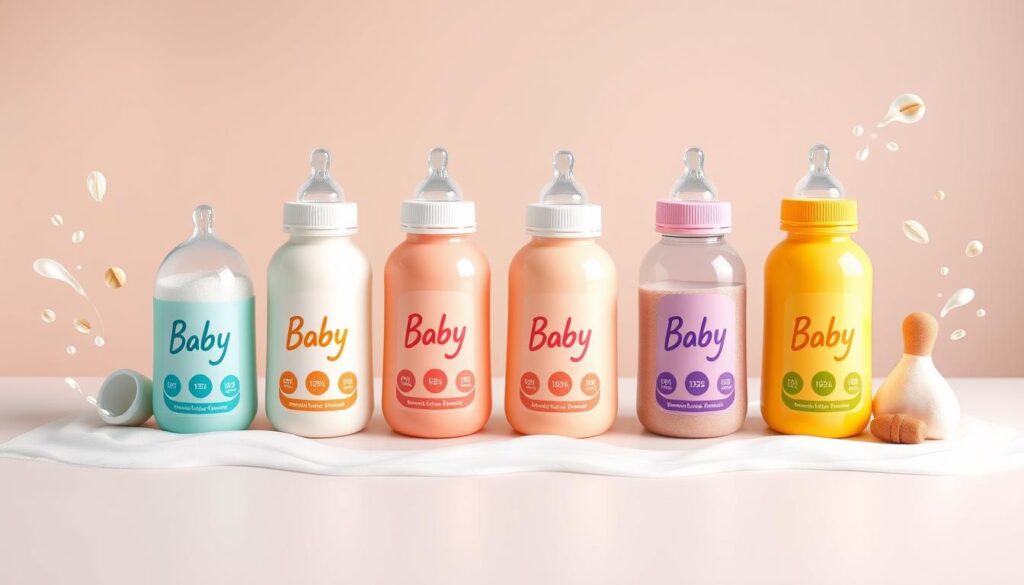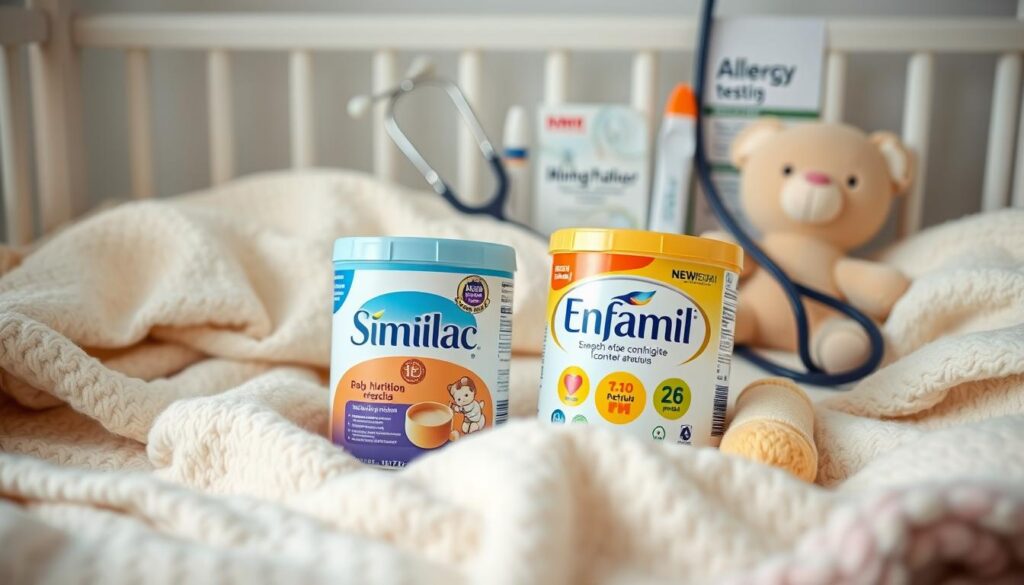Choosing the right infant formula can be tough for parents. The options from Similac and Enfamil seem endless. Each one claims to help your baby grow the best.
We’ve spent many nights researching the best formula for our babies. It’s not just about the cost or ease of use. It’s about knowing the small details that matter for your child’s health
This guide will help you understand the differences between Similac and Enfamil. We’ll look at nutritional content and what experts say. Our goal is to help you choose the best formula for your family.
Key Takeaways
- Understanding the key differences between Similac and Enfamil
- Comprehensive comparison of nutritional content
- Insights into formula selection for specific baby needs
- Expert recommendations and parent feedback
- Navigating infant formula choices with confidence
Overview of Similac and Enfamil
Parents often face a big choice when it comes to baby nutrition: Similac and Enfamil. These brands have been helping families for years. They offer solutions for babies’ nutritional needs at every stage.
What is Similac?
Similac is made by Abbott Laboratories. It’s a top choice for infant formula. The brand has a wide range of products for different baby needs.
- Similac Advance: Standard infant nutrition
- Similac Pro-Sensitive: For babies with mild digestive issues
- Similac Pure Bliss: Organic formula option
What is Enfamil?
Enfamil is made by Mead Johnson. It’s known for its scientific approach to baby nutrition. Enfamil’s formulas are designed to be close to breast milk.
Similarities and Differences
| Feature | Similac | Enfamil |
|---|---|---|
| Core Ingredients | Milk-based proteins | Milk-based proteins |
| Vitamin Fortification | DHA, ARA | DHA, ARA |
| Specialty Formulas | Multiple options | Multiple options |
Both Similac and Enfamil offer different ways to support baby nutrition. This gives parents many choices to help their child grow.
Nutritional Ingredients in Both Formulas
Knowing what’s in baby formula is key for parents. It’s about finding the best for their little one’s growth. Infant formula gives vital nutrients for healthy development in the early years.
Our comparison shows the details of two top infant formula brands. It highlights their unique nutritional benefits.
Key Nutrients in Similac
Similac aims for complete nutrition with a special mix of ingredients:
- Protein from milk and whey protein concentrate
- Essential fatty acids for brain development
- Vitamins A, D, E, and K
- Minerals including calcium and iron
Key Nutrients in Enfamil
Enfamil has a strong formula to help babies grow:
- Partially hydrolyzed whey protein
- Omega-3 DHA for cognitive development
- Choline to support brain function
- Balanced mineral content
Comparing Protein Sources
Protein is vital in infant formulas. Both Similac and Enfamil use milk-based proteins. But, they differ slightly in how they’re processed and the amount used.
“Choosing the right formula is about understanding the nuanced differences in nutritional composition.” – Pediatric Nutrition Expert
Parents should talk to healthcare experts. They can help pick the best formula for their baby’s needs.
Types of Formulas Offered
Finding the right infant formula can be tough for new parents. Similac and Enfamil offer a wide range of formulas. They cater to different needs and preferences.
Parents looking for the best formulas have many choices. Let’s look at the different types available:
Standard Infant Formulas
Most healthy babies need these basic formulas:
- Similac Advance
- Enfamil Infant
- Complete first-stage nutrition
- Designed for babies 0-12 months
Specialized Formulas
These brands have formulas for special needs:
| Condition | Similac Option | Enfamil Option |
|---|---|---|
| Sensitive Stomachs | Similac Sensitive | Enfamil Gentlease |
| Colic Relief | Similac Total Comfort | Enfamil Nutramigen |
| Reflux Management | Similac Pro-Sensitive | Enfamil A.R. |
Organic and Non-GMO Options
Health-conscious parents have organic choices:
“Organic formulas provide peace of mind for parents seeking pure nutritional options for their infants.” – Pediatric Nutrition Expert
- Similac Organic
- Enfamil Organic
- USDA-certified organic ingredients
- Non-GMO verified options
Always talk to your pediatrician to find the best formula for your baby.
Target Age Ranges for Each Brand
Choosing the right baby nutrition formula is key. It depends on knowing your child’s developmental stage. Similac and Enfamil offer formulas for every stage, from birth to toddlerhood.
Newborns and Infants
Parents have to pick the best formula for their babies. Similac and Enfamil have special formulas for infants. They meet the babies’ early growth needs.
- Stage 1 formulas for 0-6 months
- Enhanced nutrient profiles supporting early growth
- Easily digestible protein compositions

Toddlers
As kids grow, their nutritional needs change. Both brands have formulas for toddlers. These formulas meet their new dietary needs.
| Brand | Toddler Formula Features |
|---|---|
| Similac | Supports cognitive development, enhanced calcium |
| Enfamil | Brain-building nutrients, balanced mineral content |
Specialty Needs
Every child is different. Similac and Enfamil have formulas for special needs. They include formulas for premature babies, lactose sensitivity, and allergies.
- Premature infant formulas
- Lactose-sensitive options
- Hypoallergenic solutions
“Choosing the right formula is about understanding your baby’s individual nutritional journey.” – Pediatric Nutrition Expert
Parents should always consult healthcare professionals when selecting the most appropriate formula for their child’s specific needs.
Taste and Texture Comparisons
Parents often look into the differences between baby formula brands. Taste and texture are key in what babies like. It’s important to know how Similac and Enfamil compare.
Taste Test Insights
Our research shows interesting differences in how these formulas taste. Babies can be very picky about their formula. Some parents say:
- Similac tastes slightly sweeter
- Enfamil tastes more neutral
- Each baby might like one better than the other
“Every baby is unique, and what works for one might not work for another.” – Pediatric Nutrition Expert
Texture Evaluations
The feel of baby nutrition formulas matters a lot. Similac and Enfamil difference shows in their texture:
- Similac is often smoother
- Enfamil is a bit thicker
- Both are easy to digest
Solubility and Mixability
Parents like formulas that mix well and dissolve fully. Both Similac and Enfamil mix well:
- They mix quickly with little clumping
- They have a consistent texture when mixed right
- They’re easy to get ready for feeding
Remember, how you prepare it is crucial for your baby’s nutrition and taste.
Price Comparison
Choosing the right infant formula is a big decision. Parents look at price, quality, and nutrition when picking between Similac and Enfamil. Our review helps you understand the costs of these popular brands.
Average Costs of Similac
Similac prices change with each product. Here’s what you might pay:
- Similac Advance: $25-$30 per 32-ounce container
- Similac Pro-Advance: $28-$33 per container
- Specialized formulas: $35-$45 per container
Average Costs of Enfamil
Enfamil’s prices are similar:
- Enfamil Infant: $24-$29 per 32-ounce container
- Enfamil NeuroPro: $30-$35 per container
- Specialized options: $35-$45 per container
Cost-Effectiveness Considerations
Cost isn’t the only thing to think about. Consider servings, nutrition, and discounts to find the best value.
Smart parents look beyond the price tag and consider the overall value of their chosen infant formula.
When comparing, look at:
- Price per ounce
- Number of servings
- Subscription discounts
- Bulk purchase options
Both Similac and Enfamil have loyalty programs and online deals. These can help families save money on quality infant nutrition.
Availability and Accessibility
Choosing the right infant formula is key. It’s important to know where and how to buy these essential products. Parents need to look at different places to find their preferred formula brands.
Locating Similac Products
Similac is easy to find in many places. Parents can look for it in:
- Major grocery stores
- Pharmacies like CVS and Walgreens
- Big-box retailers such as Walmart and Target
- Online marketplaces including Amazon
Discovering Enfamil Formulas
Enfamil is just as easy to find as Similac. Parents can buy Enfamil in:
- National pharmacy chains
- Supermarket baby sections
- Online direct-to-consumer platforms
- Specialty baby supply stores
Online vs. In-Store Purchasing
Our research shows that where you buy can affect your choice. Online shopping has:
- More products to choose from
- Discounts for subscriptions
- Delivery right to your door
The key is finding a purchasing method that suits your family’s unique needs and budget.
Pro tip: Compare prices across different platforms to maximize savings on infant formula brands.
Recommendations from Pediatricians
Choosing the right baby nutrition can be tough for parents. Pediatric experts help guide families. They share insights on Similac and Enfamil.

- Nutritional completeness
- Infant’s health needs
- Digestibility
- Potential allergens
Expert Opinions on Similac
Many pediatricians like Similac for its full nutrition. Experts say it’s great for balanced baby nutrition. Here’s what they recommend:
- Good for most healthy babies
- Strong nutrition support
- Many specialized formulas
Expert Opinions on Enfamil
Healthcare providers praise Enfamil for its research-based formulas. They see the brand’s effort to meet different infant needs.
“Understanding your baby’s unique nutritional needs is key to picking the right formula,” says Dr. Emily Rodriguez, pediatric nutrition specialist.
General Guidelines from Healthcare Providers
| Consideration | Pediatrician Recommendation |
|---|---|
| Infant Age | Choose age-specific formula |
| Health Conditions | Consult for specialized formula needs |
| Allergies | Select hypoallergenic options if necessary |
Our advice is to work closely with your pediatrician. Every baby is different. Professional advice ensures the best nutrition and health.
Consumer Reviews and Feedback
Parents’ experiences are key to knowing how infant formulas work in real life. We looked into what Similac and Enfamil parents have to say. We dug into their likes and dislikes, and how loyal they are to their chosen brand.
Positive Feedback for Similac
Parents love Similac for its special mix of nutrients. They say it’s:
- Easy on sensitive babies’ stomachs
- Full of nutrients to help babies grow
- Less likely to cause gas and tummy troubles
“Similac has been a game-changer for our little one’s nutrition!” – Sarah M., mother of two
Positive Feedback for Enfamil
Enfamil gets lots of praise for its special formulas. Parents like:
- Many formula choices
- Science-backed nutrition
- Quality that stays the same in all products
Common Concerns from Parents
Even though Similac and Enfamil are well-liked, parents have some worries:
- Different prices between brands
- Allergic reactions
- How each baby reacts differently
Figuring out the similac and enfamil difference means looking at what each baby needs. Our study shows that brand loyalty often comes from personal experience and what works best for a baby.
Allergies and Sensitivities
Finding the right formula for babies with allergies can be tough for parents. It’s important to know about sensitivities and special formulas. This helps choose the best for a baby’s health.

Lactose Intolerance Solutions
Parents dealing with lactose intolerance have good options. Similac and Enfamil offer lactose-free formulas. These help prevent stomach problems while giving babies the nutrients they need.
- Lactose-free formulas provide complete baby nutrition
- Specialized proteins reduce potential allergic reactions
- Nutrient-rich alternatives support healthy infant growth
Hypoallergenic Formulas
Hypoallergenic formulas are key for babies with sensitive stomachs. They break down milk proteins into smaller pieces. This makes them easier to digest.
| Brand | Hypoallergenic Option | Key Features |
|---|---|---|
| Similac | Similac Alimentum | Extensively hydrolyzed protein formula |
| Enfamil | Nutramigen | Clinically proven allergy management |
Potential Allergens in Each Brand
Knowing about potential allergens helps parents choose wisely. Both Similac and Enfamil list ingredients that might cause issues.
“Always consult your pediatrician when selecting a formula for a child with known allergies or sensitivities.”
Our guide helps parents through the complex world of baby nutrition. We aim to ensure every baby gets the best diet.
Transitioning Between Formulas
Switching baby formulas can be tough for parents. It’s important to think carefully to keep your baby happy and healthy.
Changing formulas is a careful step. Pediatric nutritionists offer tips to ease the change and avoid upset stomachs.
Guidelines for Switching Formulas
- Consult your pediatrician before making any formula changes
- Understand your baby’s unique nutritional needs
- Observe your infant’s reaction during the transition
- Keep detailed notes about feeding responses
Gradual Transition Techniques
Parents should use a slow transition method. Slow and steady wins the race when introducing new formulas.
| Transition Phase | Mixing Ratio | Duration |
|---|---|---|
| Initial Introduction | 25% New Formula / 75% Original | 2-3 Days |
| Midpoint Transition | 50% New Formula / 50% Original | 2-3 Days |
| Final Transition | 75% New Formula / 25% Original | 2-3 Days |
Possible Side Effects
Changing formulas can cause temporary digestive issues. Look out for:
- Mild stomach discomfort
- Changes in stool consistency
- Slight alterations in feeding patterns
“Every baby is unique. What works for one might not work for another.” – Pediatric Nutrition Association
Stay patient and watch closely during the transition. Your pediatrician can offer advice suited to your baby’s needs.
Conclusion: Choosing the Right Formula for Our Babies
Choosing between Similac and Enfamil can be tough for parents. Both formulas are packed with nutrients to help babies grow. They are designed to meet the needs of infants.
Recap of Key Differences
Similac and Enfamil have different ways of providing nutrition. They offer formulas for different stages of a baby’s life. Even though they aim for the same nutritional goals, they have unique ingredients and blends.
Personal Considerations for Our Family
Choosing the right formula is a big decision. It depends on your baby’s health, allergies, and what your doctor says. Think about how well the formula is digested, its nutrient content, and if it might cause allergies.
Final Thoughts on Similac and Enfamil
Both Similac and Enfamil are reliable choices for baby nutrition. It’s best to talk to a doctor to find the right formula for your baby. Every baby is unique, and the right formula can make a big difference in their growth.

